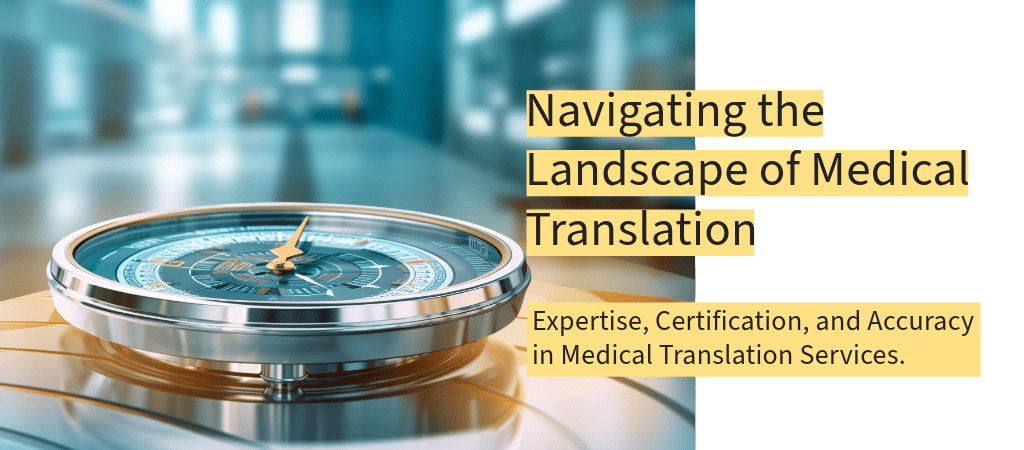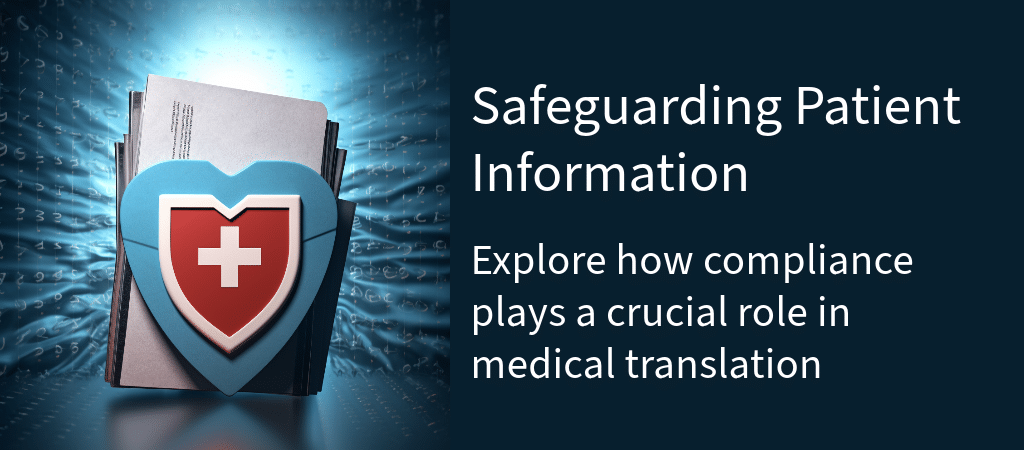
Introduction
The realm of medical translations is a complex one, demanding precision and a deep understanding of the subject matter to accurately convey intricate health information. The stakes are high, as even minor errors can lead to severe consequences for patients and pose liability risks for healthcare providers. For instance, a misinterpreted medication dosage could result in harm or even death. Furthermore, poorly translated patient materials contribute to billions in costs annually due to non-compliance. With a significant number of Americans lacking English proficiency, the need for accurate medical translation services is more critical than ever.
This article will cover how to identify top-tier medical translators, key capabilities to look for, and guidance for selecting the right service for your needs. Whether translating patient records, clinical trials or medical devices, a reliable translator can ensure safety, compliance and understanding. Investing in qualified translators mitigates risks and prevents poor outcomes.
The Importance of Expertise in Medical Translation
When choosing a medical translation service, it’s crucial to seek out translators with a specific medical background. Having firsthand experience as a doctor, nurse, technician, or in other healthcare roles provides a deeper understanding of medical terminology and contexts. This subject matter expertise is key to ensuring medical translation accuracy amid the subtleties of the medical field.

Understanding the Translator Certification Process
Certified medical translators must meet strict criteria, including advanced degrees demonstrating language mastery, training in medical concepts, years of proven translation experience, and passing rigorous exams conducted by expert reviewers. They must also adhere to ethical codes. Widely recognized certifications are from the American Translators Association (ATA) and the National Board of Certification for Medical Interpreters (NBCMI), which validate the skills necessary for accurate translations.
In addition to certification, many healthcare providers require official notarization. This involves a licensed notary public attesting to the validity of the translated documents, ensuring that the translations are legally compliant.
The Value of Certified and Notarized Translators
Certified medical translators are instrumental in avoiding critical errors and providing reliable translations. Notarization further validates the legitimacy of their work, ensuring that the translations will be accepted by healthcare and legal entities. Certified and notarized translators are adept at swiftly conveying nuanced details, allowing patients to confidently share sensitive health information, doctors to receive accurate guidance for care, and researchers to obtain meticulous results.
Overall, certification and notarization provide assurance of precision, professionalism and trustworthiness. They demonstrate translations are legally binding and error-free for official use.
Key Features of Top Medical Translation Services
When evaluating a medical translation service, there are several key features to consider:
Quality Assurance and Accuracy
The best services have rigorous quality assurance processes to ensure error-free translations. These include proprietary double-checking of results by senior translators, manual audits of random samples, and advanced software checks comparing against source content. Some firms even have in-house medical and language experts review completed translations for total accuracy.
Complex documents like clinical trial protocols, investigational drug manuals, medical device instructions or patient informed consent forms require flawless specialized translations. The top services have both human expertise and technology needed to handle meticulous conversions of such intricate medical material.
Broad Language Options
Quality medical translation services offer a wide range of language options, accommodating even less common languages. They employ native speakers for major languages like Spanish, Chinese, Arabic, and also cater to rare dialects. This broad language coverage is key for global clinical trials, catering to multilingual patients, or expanding into new markets.
Speed and Responsiveness
Top-tier medical translation services understand the urgency of healthcare needs. Whether it’s instant interpretation during patient exams, quick translations for accurate diagnoses, or meeting tight research deadlines, these services have the capacity and systems to deliver most standard translations within 24 hours, or immediately for short requests.
Handling Complex Documents
Specialist medical translators are adept at handling complex documents like clinical studies, medical journals, adverse event reports, and patient histories. They possess deep expertise in anatomy, physiology, pharmaceuticals, and healthcare terminology, ensuring flawless conversions of intricate medical material.

HIPAA Compliance and Ethical Standards
Reputable medical translation services comply with healthcare privacy laws and ethical codes. They adhere to HIPAA rules and implement security controls like encryption to safeguard sensitive patient data. For clinical trials, they maintain research ethics and integrity standards.
Guidance on Selecting a Medical Translation Service
Checking Credentials and Work Samples
Vet translator qualifications thoroughly. Verify certification status, education, experience and specialties. Request work samples to evaluate accuracy. For privacy, samples can exclude identifying patient details. Samples will showcase expertise translating medical content into the required language. The precise terminology conveys capabilities.
Comparing Pricing
When selecting a medical translation service, balance quality and cost. The lowest rates may indicate uncertified translators or risky outsourcing. However, the most expensive does not always mean best quality. Compare vendors’ rates for standard documents like patient records, journal articles or clinical trial materials. Factor in volume discounts. Seek fair pricing aligned with strong qualifications.
Prioritizing Specialization
Choose specialty medical translation services over generalists. Focused experience with medical topics enables nuanced mastery. General multi-field agencies may dabble weakly in healthcare. Specialized translators better comprehend clinical details and terminology. They accurately convey complex medical concepts. Narrow expertise inspires confidence in handling sensitive documents.
Reading Independent Reviews
Consult independent reviews on third-party sites to guide selection. Client testimonials on a company’s website may be cherry-picked. Objective reviews reveal fuller perspectives. Check reviews mentioning specific translators to assess skills. Look for consistent praise of accuracy, responsiveness, on-time delivery and compliance. Be wary of pervasive complaints. Patterns in multiple reviews help identify the best services.
Choosing the Right Medical Translation Service
When selecting a medical translation service, it’s important to thoroughly vet translator qualifications, compare pricing, prioritize specialization, and consult independent reviews. Following this checklist can help you evaluate and select the right medical translation provider:
- Certification – Require ATA, NBCMI, or equivalent certification
- Specialization – Prioritize healthcare/medical focus over generalists
- Work Samples – Review translations for accuracy and terminology
- Language Breadth – Ensure the service offers required languages, even rare ones
- Quality Assurance – Validate the process to ensure precision
- Security – Confirm HIPAA and data privacy compliance
- Pricing – Compare vendor rates fairly based on experience and capabilities
- Responsiveness – Assess the ability to meet urgent or rush needs
- Reviews – Check independent sites for consistent feedback
Questions to Ask Potential Translators
• What are your specific certifications and qualifications in medical translation?
• How many years of experience do you have translating healthcare/medical documents?
• What is your quality assurance process to validate accuracy?
• What regulations do you comply with around ethics, privacy and security?
• How quickly can you handle large documents or urgent requests?
• What is your experience accurately translating complex medical terminology?
• May I see samples of healthcare documents you have translated?
To Compare Pricing:
- Consider per word or per page rates for key document types
- Factor in minimum order requirements
- Ask about volume discounts for large projects
- Clarify what is included (editing, proofing, certifications)
- Calculate total project costs based on needs
Conclusion
In summary, working with highly qualified medical translation specialists is critical to ensure safety, compliance, and accuracy. Certified translators with healthcare expertise provide reliability through their mastery of complex medical terminology and nuanced details. They understand intricate contexts and follow strict protocols to maintain confidentiality per regulations.
Specialized medical translators avoid dangerous errors and deliver high volumes of meticulous translations quickly. Their deep experience with medical documents and subject matter knowledge enables flawless conversion of patient records, clinical trials data, medical device instructions, and other sensitive information.
Overall, certified translators with focused medical backgrounds offer seamless communication with patients worldwide. They facilitate effective research and expansions into global markets. A thoroughly vetted specialized partner provides legally binding, precise translations you can trust across borders. Following the guidance in this article will help identify and select the right medical translation service for your needs and prevent the risks of poor outcomes.
